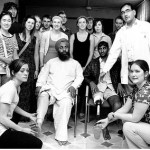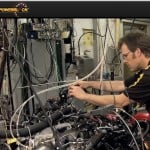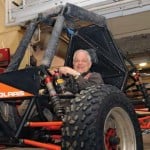 Jaipur Foot gets an American facelift: There is soon going to be a Michigan version of the celebrated Jaipur Foot, considered to be among the world’s cheapest and most user-friendly artificial limbs. Read more from the Hindu Times
Jaipur Foot gets an American facelift: There is soon going to be a Michigan version of the celebrated Jaipur Foot, considered to be among the world’s cheapest and most user-friendly artificial limbs. Read more from the Hindu Times
MEEM Graduate Seminar: Thursday March 29, 2012 4:00-5:00 p.m.
ME-EM building, Room 112
Hong G Im
Associate Professor, Department of Mechanical Engineering, University of Michigan
Professor Hong G. Im received his B.S. in Mechanical Engineering from Seoul National University in 1986, M.S. in Mechanical Engineering from Seoul National University in 1988, and M.A. and Ph.D. in Mechanical and Aerospace Engineering from Princeton University in 1991 and 1994, respectively. After graduation, he spent two years as a Research Fellow at the Center for Turbulence Research, Stanford University, followed by a post-doctoral tenure at the Combustion Research Facility, Sandia National Laboratories from 1996 to 1999. He joined the University of Michigan in January 2000 in the Department of Mechanical Engineering, where he currently holds a Professor position. Hong Im’s research and teaching interests are primarily fundamental and practical aspects of combustion and power generation devices using high-fidelity computational modeling. Recent research topics include modeling of combustion in low temperature combustion engines, advanced models for turbulent sooting flames, and combustion characteristics of high hydrogen content fuels for advanced gas turbine applications. He is a recipient of the NSF CAREER Award in 2002 and SAE Ralph R. Teetor Educational Award in 2006. He is an Associate Fellow of American Institute of Aeronautics and Astronautics (AIAA), and serves as an Associate Editor for the Proceedings of the Combustion Institute.
UNDERSTANDING AUTO-IGNITION AND COMBUSTION CHARACTERISTICS THROUGH HIGH-FIDELITY SIMULATION
Recent advances in the massively parallel computing technology have enabled first principle simulations of laminar and turbulent reacting flows to unravel fine-scale physics with ultimate realism and accuracy. To achieve this mission successfully, however, it is essential to develop reliable algorithms that are free from turbulence modeling errors and numerical dissipation.
Furthermore, the implemented submodels should be able to describe the essential physical and chemical processes, such as radiative heat transfer, spray dynamics, and soot formation. This presentation will provide an overview of recent research activities using direct numerical simulations (DNS) with detailed chemistry and transport. In particular, DNS of auto-ignition in the presence of mixture stratification is analyzed to provide insights into the characterization of
auto-ignition regimes and as a means to develop improved mixing models for turbulent combustion simulations.
Funding for the ME-EM Graduate Seminar Series is provided by Professional Plating, Inc. of Anoka, MN www.proplate.com
and the Department of Mechanical Engineering – Engineering Mechanics www.me.mtu.edu/seminar
Four graduate students are going to Lansing for Graduate Education Day, Thursday, March 29. Governor Rick Snyder has declared the week of March 26 as Graduate Education Week, and more than 50 students from universities and colleges across the state will meet with legislators at the Capitol Building in Lansing.
Represenmting Michigan Tech and ME-EM, Mark Hopkins, a PhD candidate in mechanical engineering from Charlotte. He will be discussing his work on in-space electric rockets.
 ‘Horsepower TV’, a Spike TV program about building hot rod engines, showed Michigan Tech research being done testing engines running on E85 fuels.
‘Horsepower TV’, a Spike TV program about building hot rod engines, showed Michigan Tech research being done testing engines running on E85 fuels.
The episode is posted online at: Horsepower TV
The segment about E85 is at 13 minutes.
 The 2012 Society of Automotive Engineers SAE Clean Snowmobile Challenge is being held at Michigan Technological University Houghton, Michigan. Links to Photos and Videos of 2012 SAE Clean Snowmobile Challenge Action can be found at 2012 SAE Clean Snowmobile Challenge Videos
The 2012 Society of Automotive Engineers SAE Clean Snowmobile Challenge is being held at Michigan Technological University Houghton, Michigan. Links to Photos and Videos of 2012 SAE Clean Snowmobile Challenge Action can be found at 2012 SAE Clean Snowmobile Challenge Videos
Dr. Scott A Miers had been selected to receive the 2012 Society of Automotive Engineers (SAE) Ralph R. Teetor Educational Award. In the award letter it states “The credentials and standards of excellence in education of this year’s candidates were extremely high and brought about some very keen competition. Your outstanding contributions have distinguished you as one of the top engineering educators.” As a recipient Scott is invited as a guest for the week of the 2012 SAE World Congress which begins on April 24th in Detroit, MI, including the award ceremony on Tuesday of that week, and will be presented with a plaque.
 Bill Shapton Featured in Michigan Tech Magazine: An engine of change (PDF)
Bill Shapton Featured in Michigan Tech Magazine: An engine of change (PDF)
A bumpy ride in the bush in an off-road vehicle has paved the way for the industrial readiness of engineering students nationwide.
See the historic video clips from 1970s SAE Collegiate Design competitions
 Members of Michigan Tech’s chapter of the National Society of Black Engineers (NSBE) are in Detroit to participate in an alternative spring break 2012 week. Eight members of the Michigan Tech student chapter of the NSBE will visit six middle schools and one high school to talk with students. They will also conduct Family Engineering events at three schools. Family Engineering includes fun, hands-on activities for the whole family, such as “Mining For Chocolate” and “Glue Is The Clue.” The program, developed at Michigan Tech and now available across Michigan and nationwide, is designed to engage and inspire young people and their families to consider careers in engineering and science. Read More
Members of Michigan Tech’s chapter of the National Society of Black Engineers (NSBE) are in Detroit to participate in an alternative spring break 2012 week. Eight members of the Michigan Tech student chapter of the NSBE will visit six middle schools and one high school to talk with students. They will also conduct Family Engineering events at three schools. Family Engineering includes fun, hands-on activities for the whole family, such as “Mining For Chocolate” and “Glue Is The Clue.” The program, developed at Michigan Tech and now available across Michigan and nationwide, is designed to engage and inspire young people and their families to consider careers in engineering and science. Read More
UPDATE: See a Video about Engineering Students Spring Break to Detroit Schools
Thursday March 22, 2012 4:00-5:00 p.m.
ME-EM building, Room 112
Greg McKenna
Horn Professor, Department of Chemical Engineering, Texas Tech University
Dr. Gregory B. McKenna has a reputation as a pioneering researcher in four areas of polymer and plastics science and technology: Physical Aging and Structural Recovery of Polymer Glasses, Solid Mechanics and Nonlinear Viscoelasticity of Polymers, Thermodynamics and Mechanics of Elastomers and Gels, Molecular Rheology.
He received his Bachelor’s in Engineering Mechanics at the U.S. Air Force Academy, and his MS in the area of composite materials from MIT. He entered active duty as a test and evaluation engineer at Hill Air Force Base in Ogden, Utah. In 1976 he received his Ph.D. in Materials Science and Engineering at the University of Utah. Dr. McKenna started at the National Bureau of Standards (now called NIST) as a National Research Council Postdoc and accepted a permanent position as a staff scientist in 1977. He served
as the head of the Structure and Mechanics Group in the Polymers Division at NIST from 1992-99. In 1989 Dr. McKenna became a Fellow of the American Physical Society and was the recipient of the NIST E.U. Condon Award for excellence in technical exposition for his classic review article “Glass Formation and Glassy Behavior.”
In 1998, he was elected a Fellow of the Society of Plastics Engineers.
After NIST, he joined Texas Tech University as a Professor in the Department of Chemical Engineering and the John R. Bradford Endowed Chair in Engineering. In 2005 he became a Paul Whitfield Horn Professor at TTU.
He is the 2009 recipient of the Bingham Medal of the Society of Rheology, has received the International Award of the Society of Plastics Engineers, and the Mettler Toledo Award from the North American Thermal Analysis Society. He served on the Governing Board of the American Institute of Physics, the Executive Committees of the
Society of Rheology and The Division of High Polymer Physics (DHPP) of the American Physical Society. He was the Chairman of the DHPP, the Society of Engineering Science, and the Polymer Analysis Division of the Society of Plastics Engineers. Currently he is vice-president of the Society of Rheology.
Title: Using Mechanics to Interrogate the Physics of Soft Matter:
From the Glassy to the Rubbery States and from the Macro-scale to the Nano-scale
Abstract: Mechanical measurements offer a unique means of interrogating the physics of am orphous glass-formers and rubbery polymers. Here we present several vignettes to demonstrate the ability of both classical and novel rheological experiments to resolve important questions in condensed matter physics. First, results from torque and normal force measurements aimed at understanding the thermodynamics and m echanics of polymer networks in both dry and swollen states are presented. In particular, we examine the validity of the Frenkel-Flory-Rehner theory of rubber network swelling. Torsion and normal force measurements are also described for a series of polymeric glasses that exhibit similar shear moduli but, surprisingly, very different normal force responses, with one set of materials showing extreme deviations from neo-Hookean behavior and the other being close to neo-Hookean. We then describe the use of a novel torsional dilatometer, which allows simultaneous m easurement of mechanical properties and volume recovery, to investigate the aging and rejuvenation behaviors of glassy polymers.
The temperature dependence of dynamics is probed in glassy polymers that have been aged into equilibrium below the nom inal glass transition temperature and evidence is presented that time-scale divergence m ay not be a true signature of the glass transition itself. Finally, we describe a reduction in scale of the classical m embrane inflation test to allow measurement of the biaxial creep compliance of nanometer thick polymeric films using an atomic force microscope. In each instance em phasis is placed on how the measurements are designed to interrogate the physics of interest in the materials investigated.
